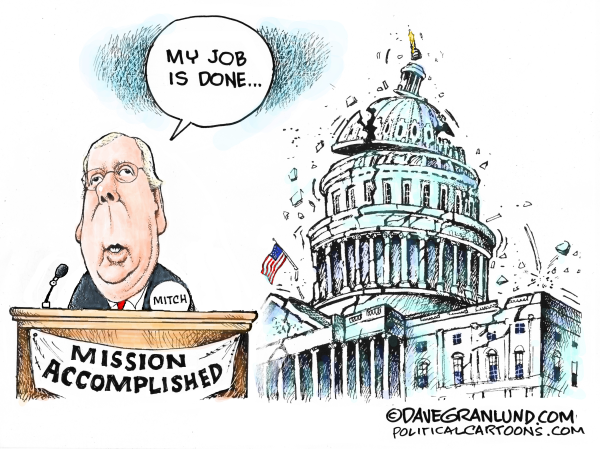
Mitch McConnell, the senior senator from Kentucky, announced that he would step down as Senate Republican leader in November, bringing to an end the longest run as a leader of either party in the Senate's history. He first became a senator in 1985 and reached the first rung on the leadership ladder, majority whip, in 2003. Now 82, McConnell is in his seventh term as a senator; it seems unlikely that he will run for an eighth.
His tenure as GOP leader has been complicated. He achieved some historic successes, such as passage of the first tax-code overhaul in 30 years. He made some historic blunders, such as protecting Donald Trump from a Senate impeachment conviction following the violent attempt to overturn the 2020 election results. And he engaged in bare-knuckles political combat for which his opponents will never forgive him, such as refusing to schedule a hearing on Merrick Garland's Supreme Court nomination.
McConnell was the most consequential Senate leader since Lyndon Johnson, and his tenure will keep historians busy for years. But for a two-sentence thumbnail sketch of McConnell's political qualities, it would be hard to improve on Peggy Noonan's formulation in The Wall Street Journal:
"As leader, McConnell was subtle, saw around corners, never lost his head, skillfully herded some highly unusual cats," she wrote. "He wasn't a visionary but kept in his mind the big picture and played a long game."That sounds right to me, though I would add as well that McConnell was a judicious and quiet adult in a Congress increasingly stuffed with tiresome and immature poseurs who excel primarily at making noise.
There will be plenty of time to sift and sort through the entirety of the McConnell era but for now I want to focus on a single quote, spoken long ago, that drove his Democratic foes bonkers.
The quote came in an interview with National Journal. "The single most important thing we want to achieve," McConnell said, "is for President Obama to be a one-term president." If you follow politics — especially if you're a Democratic loyalist — you almost certainly know that quote. But if you are like the vast majority of Democrats who quote it, you almost certainly have never seen those words in context.
McConnell's words have been invoked as evidence of the man's ruthless partisanship and confirmation that he was never willing to compromise with Obama. Democrats often claimed that McConnell issued that declaration of unbudging hostility as soon as Obama entered the White House.
Obama himself claimed as much.
"When I first came into office," he said in a "60 Minutes" interview shortly before his 2012 reelection, "the head of the Senate Republicans said, 'My number one priority is making sure President Obama's a one-term president.' Now, after the election, either he will have succeeded in that goal or he will have failed at that goal."
Democratic Senator Richard Durbin of Illinois made the same point. Speaking in the Senate in the fall of 2012, he declared that "the senator from Kentucky ... announced at the beginning, four years ago, exactly what his strategy would be. He said his number one goal was to make sure that Barack Obama was a one-term president."
But Obama and Durbin were wrong. McConnell hadn't been speaking "at the beginning" or when Obama "first came into office." Obama was elected in 2008; McConnell's interview took place two years later. It was not a Day 1 declaration of total war against a new president. It was something quite different: a discussion of political realities on the eve of midterm elections in which Republicans were poised to win control of both houses of Congress.
In his interview with National Journal — a sober publication aimed at policy wonks and campaign analysts — McConnell was explaining that even with control of Congress, Republicans would not be able to advance their agenda as long as the White House was occupied by a president who could veto GOP legislation. So to achieve their biggest policy goals, Republicans would have to hold Obama to a single term by recapturing the White House in 2012. There was nothing incendiary about McConnell's comment; if anything, it was a statement of the obvious.
To anyone who reads the interview, it is perfectly obvious that McConnell wasn't drawing a line in the sand or emitting a war cry. He was discussing how things get done in Washington. Indeed, in his very next sentence — which of course is never quoted — McConnell told his interlocutor that if Obama would be "willing to meet us halfway on some of the biggest issues," congressional Republicans would gladly "do business with him." A moment later he underscored the point: "I don't want the president to fail; I want him to change," McConnell said. "So, we'll see. The next move is going to be up to him."
I realize that none of this is likely to mitigate the bitterness many liberal partisans feel toward McConnell. But the attacks on the outgoing Republican leader for his "one-term" quote were always a low blow — sometimes a very low blow. His words neither meant what the angry critics claimed they meant, nor were they uttered when the critics said they were. Democrats had many substantive reasons to resent McConnell.
This one was just a cheap shot.
Jeff Jacoby is a columnist for The Boston Globe, from which this is reprinted with permission."


 Contact The Editor
Contact The Editor
 Articles By This Author
Articles By This Author